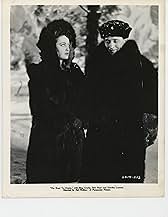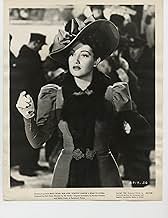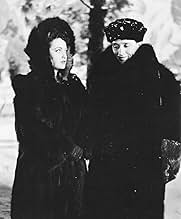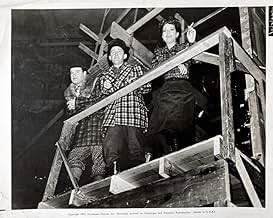PUNTUACIÓN EN IMDb
7,1/10
3,8 mil
TU PUNTUACIÓN
Añade un argumento en tu idiomaTwo vaudeville flops pose as bad guys and join the Klondike gold rush with a saloon singer.Two vaudeville flops pose as bad guys and join the Klondike gold rush with a saloon singer.Two vaudeville flops pose as bad guys and join the Klondike gold rush with a saloon singer.
- Nominado para 1 premio Óscar
- 1 nominación en total
Jack La Rue
- LeBec
- (as Jack LaRue)
George Anderson
- Townsman
- (sin acreditar)
Stanley Andrews
- Joe - Official at Ship
- (sin acreditar)
Bobby Barber
- Bartender
- (sin acreditar)
William 'Billy' Benedict
- Second Newsboy
- (sin acreditar)
Carmella Bergstrom
- Woman
- (sin acreditar)
Billy Bletcher
- Bear
- (voz)
- (sin acreditar)
Phil Bloom
- Show Spectator
- (sin acreditar)
Eddie Borden
- Man in Saloon
- (sin acreditar)
Rudy Bowman
- Show Spectator
- (sin acreditar)
Argumento
¿Sabías que...?
- CuriosidadesBob Hope recalled that during the scene where he and Bing Crosby were bedding down beside their cabin in the Klondike, they were to be joined by a bear. They were told that the bear was tame and its trainer would always be nearby. Against their better judgment they went along with it. However, when the cameras started filming, the bear ambled over to Hope and, instead of lying down next to him like it was supposed to, the animal sniffed him and started growling. Hope and Crosby immediately stopped the scene and refused to work with the bear any longer, despite the trainer's protestations that it was tame and harmless. The next day the bear attacked its trainer and tore his arm off.
- PifiasThe right arm of the person holding the talking fish is visible.
- Citas
[Duke loses a talent show to a trained monkey]
Chester Hooton: [to Duke] Next time I bring Sinatra.
- Créditos adicionalesNarrator Robert Benchley credits himself orally in a precredit sequence.
- ConexionesFeatured in Paramount Presents (1974)
- Banda sonoraPut It There, Pal
(1946)
Music by Jimmy Van Heusen
Lyrics by Johnny Burke
Played during the opening credits and also as background music
Performed later by Bing Crosby and Bob Hope
Reseña destacada
Road to Utopia was one of several films made during World War II and shown to GIs before reaching the civilian public. Saratoga Trunk and The Two Mrs. Carrolls are two other examples. We have some evidence for this statement. First and foremost Robert Benchley died a year before
the film had it's premier at the New York Paramount on February 27, 1946. Benchley, noted humorist and sometime film actor, provided some off and on-screen narration for the Crosby and Hope monkeyshines. He was reputed to be a big fan of both and I think he just wanted in on the fun.
Also, Crosby recorded most of the songs for Road to Utopia on July 17, July, 19 and December 8, 1944 at Decca studios. The song Personality wasn't recorded by him until January 16, 1946, however in the film, Dorothy Lamour sang it.
It was worth the wait for the civilian public. By now the boys had the surreal nonsense down pat. Dorothy Lamour plays Skagway Sal who's father is murdered in the first minutes of the movie by killers Sperry and McGurk. Dotty beats it up to Alaska to look up Douglass Dumbrille, her dad's best friend for assistance. As Douglass Dumbrille invariably does in these films, he's looking for the goldmine her father left for himself.
The killers take the next boat with the map that they stole from Dad in hand. But they don't reckon with the sharpie and the schnook who have stowed away on the boat to Alaska. Crosby and Hope steal the map and the killer's identity.
The plot I've described so far could be a melodrama, but not in any film with the title beginning "Road to......" Between talking bears, talking fish, and a cameo appearance by Santa Claus the laughs come fast and furious.
Jimmy Van Heusen and Johnny Burke wrote the songs for this surreal madcap and gave Dotty two songs, Would You and the aforementioned Personality. Crosby got his ballad, Welcome to My Dream, and a philosophical song, It's Anybody's Spring. The last one he sang on board on a ship talent contest with Hope accompanying him on the accordion. They lost to an organ grinder and a monkey which prompted Hope to comment on the next road trip he was bringing Sinatra.
And Crosby and Hope sang Goodtime Charlie which didn't make it to vinyl and Put It There Pal probably the best known of the duets they sang together in the Road pictures. Lots of dated references in the lyrics there to Crosby's horses and their respective radio sponsors. But today's audiences would still enjoy it.
One interesting fact was that the Catholic Legion of Decency a very powerful group in those days made objections to suggestive lyrics in Personality. Hard to believe in this day and age, but as another songwriter a generation later put it, "the times, they are a changin'."
Road picture references are sometimes dated, but the laughs are eternal.
the film had it's premier at the New York Paramount on February 27, 1946. Benchley, noted humorist and sometime film actor, provided some off and on-screen narration for the Crosby and Hope monkeyshines. He was reputed to be a big fan of both and I think he just wanted in on the fun.
Also, Crosby recorded most of the songs for Road to Utopia on July 17, July, 19 and December 8, 1944 at Decca studios. The song Personality wasn't recorded by him until January 16, 1946, however in the film, Dorothy Lamour sang it.
It was worth the wait for the civilian public. By now the boys had the surreal nonsense down pat. Dorothy Lamour plays Skagway Sal who's father is murdered in the first minutes of the movie by killers Sperry and McGurk. Dotty beats it up to Alaska to look up Douglass Dumbrille, her dad's best friend for assistance. As Douglass Dumbrille invariably does in these films, he's looking for the goldmine her father left for himself.
The killers take the next boat with the map that they stole from Dad in hand. But they don't reckon with the sharpie and the schnook who have stowed away on the boat to Alaska. Crosby and Hope steal the map and the killer's identity.
The plot I've described so far could be a melodrama, but not in any film with the title beginning "Road to......" Between talking bears, talking fish, and a cameo appearance by Santa Claus the laughs come fast and furious.
Jimmy Van Heusen and Johnny Burke wrote the songs for this surreal madcap and gave Dotty two songs, Would You and the aforementioned Personality. Crosby got his ballad, Welcome to My Dream, and a philosophical song, It's Anybody's Spring. The last one he sang on board on a ship talent contest with Hope accompanying him on the accordion. They lost to an organ grinder and a monkey which prompted Hope to comment on the next road trip he was bringing Sinatra.
And Crosby and Hope sang Goodtime Charlie which didn't make it to vinyl and Put It There Pal probably the best known of the duets they sang together in the Road pictures. Lots of dated references in the lyrics there to Crosby's horses and their respective radio sponsors. But today's audiences would still enjoy it.
One interesting fact was that the Catholic Legion of Decency a very powerful group in those days made objections to suggestive lyrics in Personality. Hard to believe in this day and age, but as another songwriter a generation later put it, "the times, they are a changin'."
Road picture references are sometimes dated, but the laughs are eternal.
- bkoganbing
- 22 jun 2004
- Enlace permanente
Selecciones populares
Inicia sesión para calificar y añadir a tu lista para recibir recomendaciones personalizadas
- How long is Road to Utopia?Con tecnología de Alexa
Detalles
- Duración1 hora 30 minutos
- Color
- Relación de aspecto
- 1.37 : 1
Contribuir a esta página
Sugerir un cambio o añadir el contenido que falta

Principal laguna de datos
By what name was Ruta a Utopia (1945) officially released in India in English?
Responde
![Ver Trailer [EN]](https://m.media-amazon.com/images/M/MV5BNWRiMzM4OTktNDlkMS00YWJiLWEwNDMtZTY0ZjAwMzY3YjM2XkEyXkFqcGdeQXRyYW5zY29kZS13b3JrZmxvdw@@._V1_QL75_UX500_CR0)


































